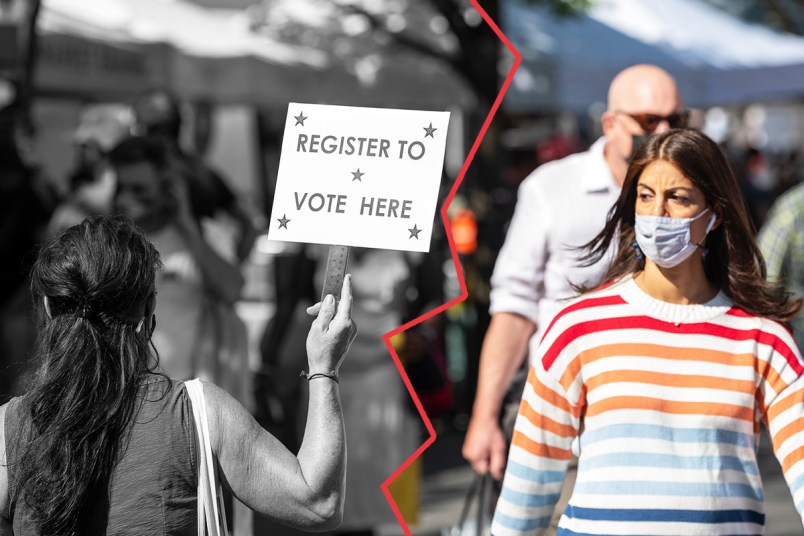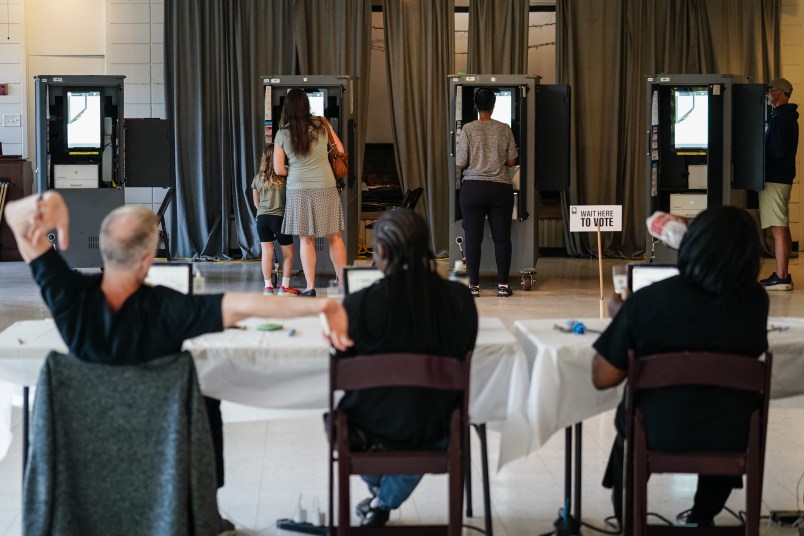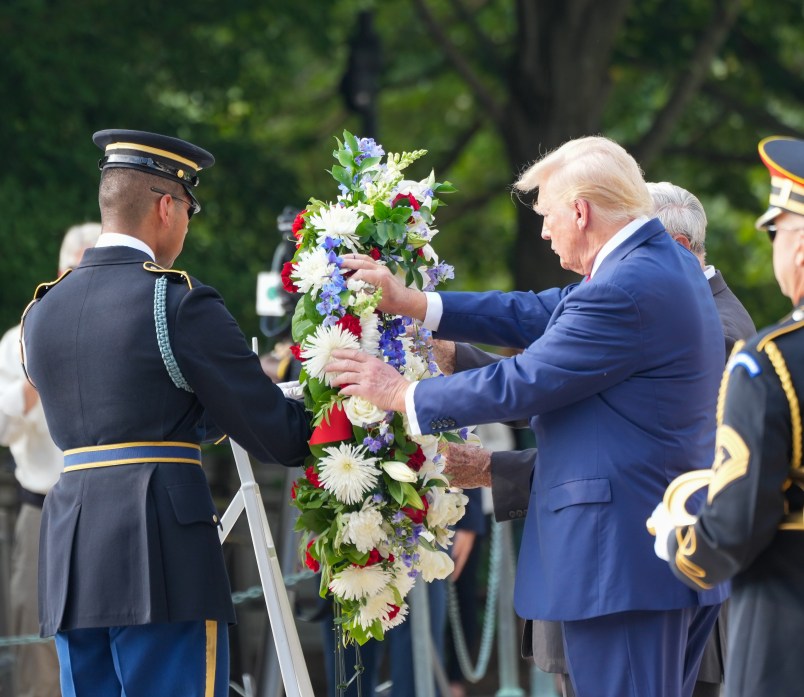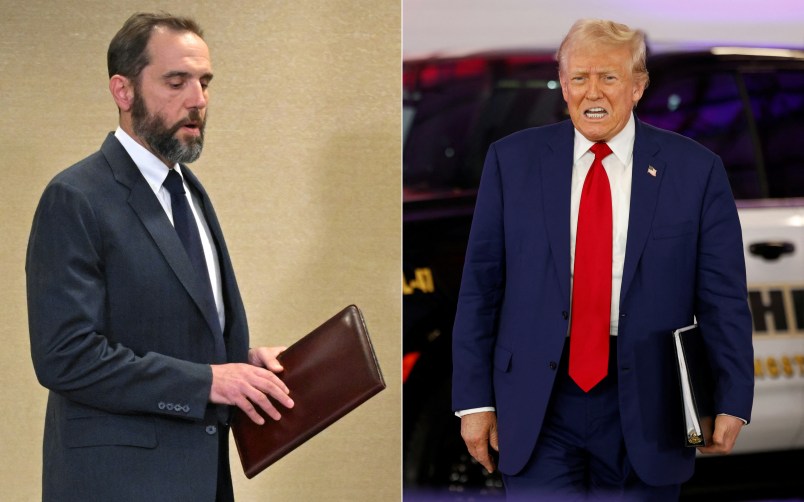The 2020 election may be remembered for Donald Trump’s attempt to steal a second term in the White House, but there’s another fundamental truth about the last election: Tens of millions of people voted amid a historic pandemic, largely without a hitch. In other words, it went well. Really well.
In large part, that’s thanks to the elbow grease of hundreds of volunteer groups across the country: Civil society organizations pitched in time and effort to register voters and help them navigate both a global pandemic and the then-president’s relentless attacks on the democratic process.
And so, over the past two years, Republicans have pursued legislation to marginalize those groups with the threat of stiff criminal penalties.
In several states, new laws and legislative proposals are creating the threat of criminal prosecution for bread-and-butter voting rights work. In Kansas, for example, the League of Women Voters has dramatically scaled back its voter registration program due to the threat of prosecution under a vague new law making it a felony to impersonate election officials. In Alabama, the sponsor of a bill outlawing private involvement in election administration said a county sheriff could face criminal prosecution for even accepting stamps for people in jail to cast absentee ballots.
The pattern of new restrictions is making voting rights groups and civil society organizations think twice about what they can safely do. Observers say that’s by design.
“It is one symptom of an overall ailment that we’re facing right now, and that is an attack on our election system,” said Tammy Patrick, senior advisor to the elections program at Democracy Fund.
“In addition to the wave of new restrictions being placed on voters themselves, there are a lot of restrictions being placed on the people who make the democratic process work,” said Sean Morales-Doyle, acting director for the voting rights program at the Brennan Center. “It’s no longer just putting obstacles in [voters’] way, it’s putting obstacles in the way of the people who might help them clear those obstacles.”
In 2020, “there was massive turnout,” Morales-Doyle added. “And this is a backlash against the turnout.”
Pausing A Robust Voter Registration Program
The threat — or potential threat — of prosecution is central to the new crackdown on voting rights groups’ work.
In Kansas, the League of Women Voters and other plaintiffs have been fighting a legal battle for nearly a year over HB 2183, which makes it a felony to engage in any conduct “that would cause another person to believe a person engaging in such conduct is an election official.”
The law is so vague that, when it was passed last year, the League ceased all in-person voter registration activities.
“We wanted to make sure that our members would not be prosecuted for work that we’ve been doing for 102 years without incident,” Jacqueline Lightcap, co-president of the state’s League, told TPM.
Prior to the law’s passage, the group was the go-to resource for election officials who didn’t have the official means to set up a voter registration presence at events around the state. Now, rather than using official registration forms and tabling side-by-side with election officials, the Kansas League refers people to a QR code, adding additional steps that voters will have to tackle on their own.
“This law really has caused us to pause and consider how we can still do this work in a climate that sometimes is very untrusting for, we feel, no legitimate reason,” Lightcap said.
The Spectre Of ‘Zuckerbucks’
Much of the recent backlash against non-governmental groups’ involvement in elections traces, oddly, to Mark Zuckerberg: The Facebook founder and his wife Priscilla Chan donated hundreds of millions of dollars in 2020 in the form of one-time grants to election offices around the country as they struggled to prepare for a pandemic election. The grants went to jurisdictions large and small, red and blue.
But because there was high turnout in large urban areas that benefited from the funds, “Zuckerbucks” have since become a right-wing bugaboo. In Wisconsin, for example, legislature Republicans’ 2020 election investigator Michael Gableman referred to the money as a bribe, despite multiple courts saying the grants were legal. An interim report he released said certain grant language “favors black and minority voters as opposed to the rest of the residents.”
More than a dozen states now have laws on the books banning election officials from outside funding, and some go further than that.
In Florida, Gov. Ron DeSantis (R) signed his election restriction package, including a rule against outside funding, during a Fox News TV hit. But the same law also forced third-party voter registration organizations to verbally warn everyone they registered that their paperwork might not make it to election offices in time — giving the impression that the volunteer registration groups were careless with voters’ forms, even though, in general, third-party groups have an excellent track record of turning registrations in promptly.
The state argued that the disclaimer was justified in part because the voter registration groups “have professional employees who profit from their participation in voter registration activities.” But a federal judge didn’t buy it, enjoining that portion of the law and referring to it as “the constitutional equivalent of using a flamethrower to dust cobwebs.”
Florida Republicans aren’t done: An update to the law, which has been passed by both chambers and awaits DeSantis’ signature, would bar election officials from accepting pro bono legal aid from outside groups — such as the organization recently formed by veteran Republican and Democratic election lawyers Ben Ginsberg and Bob Bauer, the Election Official Legal Defense Network.
Charges For Accepting Stamps?
In Alabama, a similar bill against outside funding, signed into law by Gov. Kay Ivey (R) on Wednesday, has voting rights groups worried that it will chill what have typically been productive relationships with county elections officials.
Like other states, HB 194 bars election officials and other government employees from accepting private funds for election administration. During floor debate for HB 194, its sponsor, state Rep. Wes Allen (R), acknowledged that a county sheriff could be held criminally liable if they accepted even a donation of stamps in order to facilitate absentee voting inside a county jail.
After this article was published, Alabama State Rep. Wes Allen (R), the sponsor of HB 194, told TPM in an email that the new law “does not prohibit individuals or organizations from working with their elections administrations officials” and “The State of Alabama provides each of the 67 counties with all of the resources they need to administer elections.”
But voting rights advocates worry about language in the new law criminalizing the acceptance of “personal services,” which is vague enough that it could mean all sorts of volunteer work.
“If workers are afraid that they’re going to get a criminal charge brought up against them, they’re going to probably be reluctant to work with groups outside of their own office,” said Kathy Jones, president of the Alabama League of Women Voters.
Jones said volunteers often help state and local officials with their work, like helping people with criminal records regain their right to vote, or supporting the secretary of state’s voter ID van, which provides identification the state requires voters to present.
“I think Wes Allen’s main purpose is to prevent smaller, poorer counties from getting any kind of outside help,” Jones said of the bill’s sponsor. “Everything else is sort of like collateral.”











Is this really OT here? At least in a sense, I don’t think so.
And yet in the cases of actual voter fraud no where was there a Voting Rights group involved.
Are we surprised?
Nope.
More on topic:
I distinctly remember where I got nabbed by the League of Women Voters and registered to vote. They had a table set up in the hallway outside my high school library. They were asking everyone if they would be 18 by the next election in Nov. I said yes, I signed my name, I don’t think I even showed them my DL since I signed under penalty of perjury that the information I gave was true and accurate.
I’m pretty sure that they haven’t been allowed on campus since after Columbine, you know because of security. My HS was many separate buildings with outdoor walkways and a quad. Stupid California architecture firm gave us a California climate type school instead of Midwestern school campus where we have snow.
I can’t remember the more recent black woman’s name who got nabbed in TN (?). She asked if she was eligible, the parole people said yes. She went to register, they BOE accepted her registration, and then oops the parole people gave her bad advise.